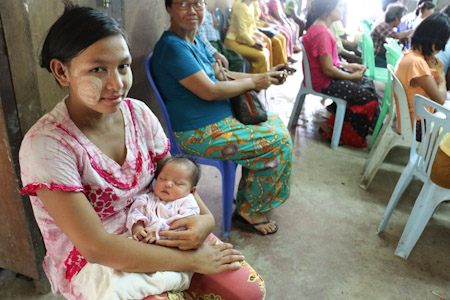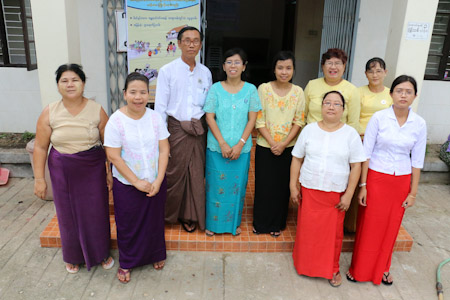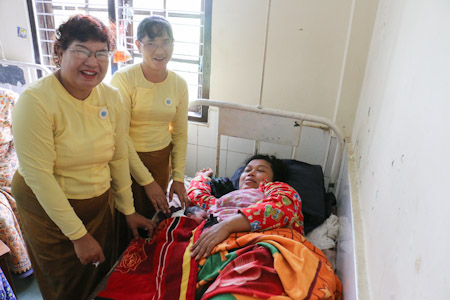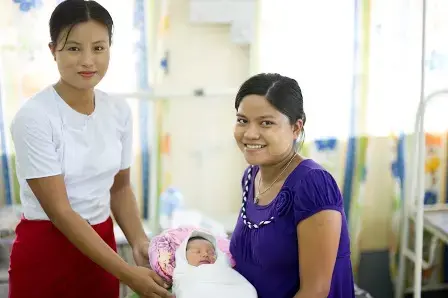Expectant mothers living in Daw Pone Township, a low-income area of Yangon, are now able to go through childbirth with the expert help of midwives as well as receive improved access to reproductive health care services, thanks to the support of UNFPA, the United Nations Population Fund and Myanmar Maternal and Child Welfare Association (MMCWA).
Approximately 70 expectant mothers, new mothers with their babies and health workers braced Monsoon rains on 21 June 2014 in the township’s general administrative office to attend an interactive training session, organized jointly by UNFPA and MMCWA covering basic hygiene and reproductive health care services to ensure safe motherhood. The training was part of efforts to promote community awareness of the upgraded services at the Daw Pone maternity clinic.
Mothers-to-be where guided through sessions on ante-natal care, delivery, breast feeding, neonatal and postnatal care, including nutritional support and family planning, emergency obstetric, HIV prevention, prevention of mother to child transmission (PMCT) of HIV, adolescent reproductive health, male involvement in maternal health and childhood immunization. The training is in 15 parts and will be carried out three times a month in each quarter with the local community.

Ma Lin Zarchi Win, a 24 year-old mother of four, who recently gave birth at the Daw Pone clinic, attended the training session with her one month old baby girl, May Myat Noe joined the training to learn more about the ante-natal care services. “I delivered my daughter at the clinic as I know that it is safe and easy. Everything went well during delivery and I was well taken care of by the midwives and doctors. That is why I choose to deliver at the clinic,” she said, adding that when her daughter would be 45 days old she would go back to the clinic to have her vaccinated, as well as receive a post-delivery check-up and information on family planning or “birth spacing” as it is referred to in Myanmar.

The Daw Pon maternity clinic is one of 22 maternity clinics operated by the Myanmar Maternal and Child Welfare Association (MMCWA) in Yangon region. It covers eight surrounding townships. The clinic was in dire need of an upgrade and needed to bolster its existing facilities as well as boost the capacity of its staff through training. Other changes included upgrading of the clinic’s equipment such as providing new delivery beds, midwifery kits and autoclave to sterilize operating instruments. Contraceptive supplies such as the Intra Uterine Contraceptive Devices (ICUD) were also provided.
The Friends of UNFPA, a non-profit organization which supports and raises funds for the work of UNFPA, supported the upgrading and the improvement of the health services at the Daw Pone maternity clinic with a donation of $75.000.
Dr. Moe Moe Aung, Township Medical Officer of Daw Pone explained that at the clinic in addition to delivering babies and ante-natal care, on a weekly basis also provide health education to volunteers and carry out blood test for HIV and other sexually transmitted infections, as well as provide counseling and home based care for HIV positive pregnant mothers. “We also support pregnant mothers with nutrition and medical supplements such as ferrous sulfate, multi-vitamins, B1 and de-worming medication,” said Dr. Moe Moe Aung.

Daw San San Maw, 38 years-old and mother of 3 girls delivered, a healthy baby girl weighing 3.5 kilo at the Daw Pon clinic on Saturday morning. This was the first time she gave birth at the clinic and there were no complications. This was a far cry from her last pregnancy which sadly had resulted in a still birth. Daw San San Maw stated that she was very “happy with the care which she had received at the clinic.” Her and her baby are still receiving post-natal care and are expected to join the rest of the family in two days.
Daw San San Maw is not planning on adding to her family. Her husband works as a street vendor selling food in Yangon and money is often tight. “We now have three girls, as sadly our last child, a son died during child birth, which is why I choose to have the last one here at the clinic,” she said. She plans on having the Depo-Provera jab, the most popular form of contraception in Myanmar, which lasts for 12 weeks and is then renewed by another injection.




